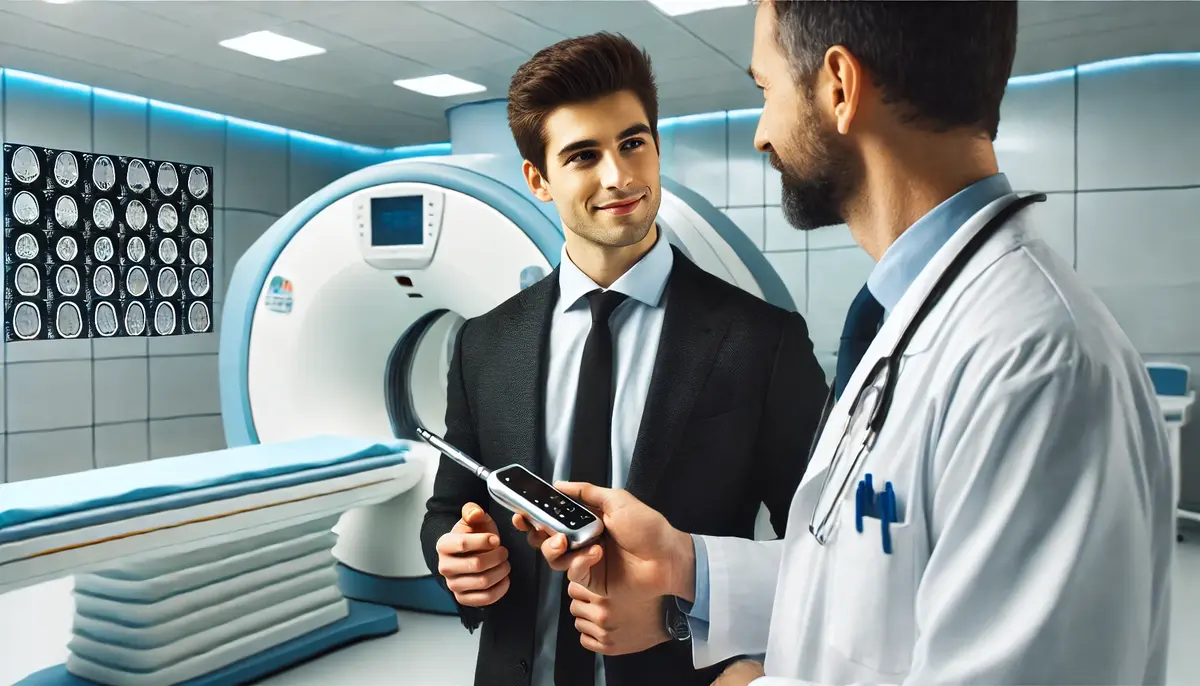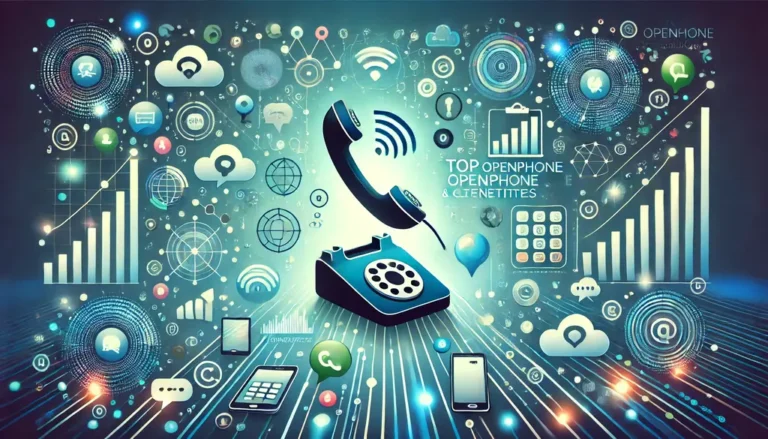The world of medical device sales is as challenging as it is rewarding. It’s a field that combines the fast-paced nature of sales with the intricate demands of the healthcare industry. For those who are passionate about both, it offers a unique opportunity to make a significant impact on patient care while enjoying a lucrative career.
But breaking into this field requires more than just a passion for healthcare and sales; it demands a deep understanding of the industry, a strategic approach to building your career, and the ability to leverage the latest technologies, including artificial intelligence (AI), to stay ahead of the competition.
This guide will walk you through everything you need to know about medical device sales—from the different types of devices you might sell to the steps you need to take to become a successful sales representative.
We’ll also explore how AI is transforming the industry and how you can use it to your advantage.
A Little About the Medical Device Sales
At its core, medical device sales involve the selling of products that are used in the diagnosis, treatment, and monitoring of health conditions. These products range from simple items like surgical gloves and bandages to complex devices such as MRI machines, heart monitors, and surgical robots.
As a sales representative, your role is not just to sell these products but to ensure that they meet the specific needs of healthcare providers and ultimately improve patient outcomes. This means you need to be well-versed in both the technical aspects of the devices and the clinical applications they support.
The medical device industry is vast and constantly evolving. It’s driven by advancements in technology, increasing demand for innovative healthcare solutions, and stringent regulatory requirements that ensure patient safety.
For sales professionals, this means there are ample opportunities, but also the need to stay constantly informed about market trends, new product developments, and changes in regulations.
The market is segmented into various categories, each with its own set of challenges and opportunities. Understanding where your strengths lie and which segment of the market you are most interested in is the first step to building a successful career.
One of the key aspects that sets medical device sales apart from other types of sales is the stringent regulatory environment. Devices must comply with standards set by organizations like the U.S. Food and Drug Administration (FDA) or the European Medicines Agency (EMA), depending on the market.
As a sales representative, you must have a solid understanding of these regulations to effectively communicate the value of your products to healthcare providers and ensure that they meet all necessary compliance requirements. This knowledge not only helps in selling but also positions you as a trusted advisor in the eyes of your clients.
Exploring Different Types of Medical Device Sales
Capital equipment sales involve selling high-value items such as MRI machines, CT scanners, and surgical robots. These are the big-ticket items in the medical device world, often costing hundreds of thousands to millions of dollars.
Selling capital equipment requires a deep understanding of the healthcare system, the ability to build relationships with key decision-makers and a long-term approach to the sales process.
The sales cycle can be lengthy, often involving multiple stakeholders, including physicians, hospital administrators, and procurement teams. Success in this area requires patience, persistence, and the ability to navigate complex sales environments.
In contrast to capital equipment, consumables, and disposables are the everyday items that healthcare facilities need in large quantities. These include products like syringes, surgical gloves, wound dressings, and other items that are used once and then discarded.
While these items may not carry the same price tag as capital equipment, they are essential to the operation of any healthcare facility. The sales process for consumables is typically faster and involves more frequent transactions.
However, competition in this area can be fierce, and success often depends on your ability to manage relationships, offer competitive pricing, and ensure a reliable supply chain.
Implantable devices, such as pacemakers, artificial joints, and stents, represent a specialized niche within the medical device industry. Selling these products requires a deep understanding of human anatomy, surgical procedures, and the specific needs of the surgeons who will be implanting the devices.
It also involves providing technical support during surgeries and ensuring that the products meet the highest standards of safety and efficacy. Building strong relationships with surgeons and other healthcare professionals is crucial, as these are high-stakes products that directly impact patient health.
In addition to selling devices, many medical device companies offer service and maintenance contracts to ensure that their products continue to function optimally over time. These contracts are particularly important for capital equipment, which requires regular maintenance and occasional repairs.
Selling service contracts requires a different approach than selling the devices themselves; it’s more about building long-term relationships and providing ongoing value to your clients.
By offering reliable support and maintenance services, you can differentiate yourself from competitors and create opportunities for repeat business.
How to Become a Medical Device Sales Representative?
Here is how to become a medical device sales representative:
Step 1: Educational Foundations and Relevant Background
While there is no strict educational requirement for entering medical device sales, having a strong foundation in life sciences, engineering, or business can give you a significant advantage. Understanding the technical aspects of the devices and how they are used in clinical settings is crucial.
Courses in anatomy, physiology, medical terminology, and healthcare management can provide valuable knowledge that will help you succeed in this field.
Additionally, a background in sales, particularly in a related field such as pharmaceutical sales, can be beneficial. If you don’t have this background, consider pursuing relevant certifications or training programs that can help bridge the gap.
Step 2: Building Practical Experience
Experience is key in medical device sales, and many employers prefer candidates who have a proven track record in sales. Starting in a related role, such as pharmaceutical sales, can provide valuable experience and help you develop the skills needed to succeed in medical device sales.
Internships, entry-level positions, or even shadowing experienced sales reps can also provide valuable insights and help you build your network. The more experience you have, the better equipped you’ll be to handle the challenges of this competitive field.
Step 3: Networking and Professional Development
In medical device sales, who you know can be just as important as what you know. Building a strong professional network can open doors to job opportunities, provide valuable industry insights, and help you stay informed about the latest trends and developments.
Attend industry conferences, join professional associations, and connect with people on LinkedIn to expand your network. Engaging with thought leaders and participating in online forums or webinars can also help you stay current and build your reputation in the field.
Step 4: Obtaining Certifications and Specialized Training
Certifications can help you stand out in a competitive job market and demonstrate your commitment to the field. The Certified Medical Sales Representative (CMSR) certification, for example, is a well-regarded credential that can enhance your resume and improve your job prospects.
Additionally, many companies offer training programs that can help you stay up-to-date on the latest products, technologies, and sales techniques. Continuous learning is crucial in this field, as the medical device industry is constantly evolving.
Step 5: Crafting a Compelling Job Application
When it comes time to apply for jobs, your resume and cover letter should be tailored to highlight your relevant experience, skills, and achievements.
Emphasize your sales experience, knowledge of the healthcare industry, and any relevant certifications or training. Be prepared to discuss your sales achievements, your understanding of the medical device market, and your ability to build and maintain relationships with healthcare professionals.
A well-crafted application will help you stand out in a competitive field and increase your chances of landing an interview.
Step 6: Excelling in the Interview Process
The interview process for medical device sales positions can be rigorous, often involving multiple rounds of interviews with different stakeholders. Be prepared to demonstrate your product knowledge, sales skills, and understanding of the healthcare industry.
Common interview questions may focus on your sales experience, your approach to building relationships, and how you handle challenges in the sales process.
Practicing your responses and doing your research on the company and its products can help you feel confident and prepared for the interview.
Step 7: Onboarding and Continuous Improvement
Once you land a job in medical device sales, the real work begins. The onboarding process will likely include training on the company’s products, sales processes, and compliance requirements.
Take advantage of this training and use it as an opportunity to deepen your knowledge and develop your skills. In addition to formal training, seek out opportunities for continuous learning, whether through online courses, industry publications, or networking events.
Staying informed about industry trends and continuously improving your skills will help you succeed in this fast-paced field.
What are Some of the Top Challenges of Medical Device Sales?
Regulatory compliance is a critical aspect of medical device sales. Devices must meet strict standards set by regulatory bodies like the FDA or EMA, and sales representatives must be knowledgeable about these requirements.
Ensuring that the products you sell are compliant not only protects your company but also helps build trust with your clients. This requires staying informed about changes in regulations and understanding the approval process for new devices.
By positioning yourself as an expert in regulatory compliance, you can differentiate yourself from competitors and build stronger relationships with healthcare providers.
Building relationships with healthcare professionals is essential in medical device sales, but it’s also one of the most challenging aspects of the job.
Doctors, surgeons, and hospital administrators are often skeptical of sales pitches, so it’s important to approach these relationships with a focus on providing value rather than just making a sale.
This means taking the time to understand their needs, offering solutions that genuinely improve patient care, and providing ongoing support. Trust is built over time, and consistent, reliable service is key to maintaining these important relationships.
Medical device sales, particularly for capital equipment, often involve long and complex sales cycles. It can take months or even years to close a deal, and the process typically involves multiple stakeholders, including physicians, hospital administrators, and procurement teams.
Managing these long sales cycles requires patience, persistence, and strong organizational skills. It’s important to stay engaged with your prospects throughout the process, providing them with the information and support they need to make a decision.
Developing a strategic approach to managing your pipeline and staying organized will help you navigate these lengthy sales cycles and ultimately close more deals.
Leveraging AI to Excel in Medical Device Sales
AI is also revolutionizing the way sales professionals identify and engage with potential clients. In medical device sales, AI-powered tools can analyze large datasets to identify healthcare facilities that are most likely to need your products.
These tools can also help you identify key decision-makers within these organizations, allowing you to target your efforts more effectively. By using AI to streamline your prospecting process, you can save time and focus your energy on the most promising leads.
CRM systems are essential tools for managing customer relationships in medical device sales. By integrating AI into your CRM system, you can gain deeper insights into your customers’ needs and preferences.
AI can analyze customer data to identify patterns and trends, helping you anticipate their needs and tailor your sales approach accordingly.
Additionally, AI can automate routine tasks, such as data entry and follow-up reminders, freeing up your time to focus on building relationships and closing deals.
Continuous learning is crucial in medical device sales, and AI can help you stay ahead of the curve. AI-driven training tools can provide personalized learning paths based on your performance and knowledge gaps, ensuring that you stay up-to-date on the latest products, technologies, and sales techniques.
These tools can also offer simulations and role-playing exercises that allow you to practice your sales pitches and refine your skills in a low-pressure environment. By leveraging AI for training and development, you can continuously improve your performance and stay competitive in the field.
Predictive analytics, powered by AI, can help you anticipate sales trends and identify high-value opportunities. By analyzing historical sales data and market trends, AI can provide more accurate sales forecasts and help you make data-driven decisions about where to focus your efforts.
This can be particularly valuable in medical device sales, where long sales cycles and complex purchasing processes make accurate forecasting challenging. By using predictive analytics, you can optimize your sales strategy and improve your chances of meeting or exceeding your sales targets.
Regulatory compliance is a critical aspect of medical device sales, and AI can help you navigate this complex landscape. AI-powered tools can monitor changes in regulations and ensure that your products meet all necessary compliance requirements.
These tools can also automate the process of generating and managing documentation, reducing the risk of errors and ensuring that you are always prepared for audits or inspections. By using AI to ensure compliance, you can protect your company and build trust with your clients.
What are Some of the Best Practices for Succeeding in Medical Device Sales?
The medical device industry is constantly evolving, with new technologies, regulations, and market dynamics emerging regularly. To stay ahead, it’s important to continuously educate yourself about these changes and adapt your sales strategy accordingly.
Subscribe to industry journals, attend webinars, and participate in conferences to keep your knowledge up to date. Staying informed not only helps you stay relevant but also enables you to provide more value to your clients by offering them the latest solutions and insights.
Technology is a key driver of success. Embracing new technologies, such as AI, can give you a competitive edge in medical device sales.
Use CRM systems to manage your customer relationships, mobile apps to stay organized on the go, and AI tools to enhance your prospecting and forecasting.
By integrating technology into your sales process, you can work more efficiently, make more informed decisions, and ultimately drive better results.
In a competitive field like medical device sales, building a strong personal brand can help you stand out from the crowd. Create a professional online presence, particularly on LinkedIn, where you can showcase your expertise, connect with industry professionals, and share insights.
Regularly post content that highlights your knowledge of the industry, such as articles, case studies, or insights on the latest trends. Networking is key in this industry, and a strong personal brand can open doors to new opportunities and collaborations.
In medical device sales, your relationship with your clients doesn’t end once the sale is made. Providing exceptional customer service is key to building long-term relationships and generating repeat business.
This means being responsive to your clients’ needs, offering ongoing support, and going above and beyond to ensure their satisfaction. By consistently delivering high-quality service, you can differentiate yourself from competitors and build a loyal customer base.
Conclusion
Breaking into medical device sales is a challenging yet rewarding journey that offers numerous opportunities for those who are prepared to navigate its complexities.
By understanding the industry, gaining the necessary experience, and leveraging the power of AI, you can position yourself for success.
Remember that continuous learning, relationship-building, and a strategic approach to sales are key to thriving in this field. As the medical device industry continues to evolve, staying adaptable and informed will help you stay ahead of the competition and seize new opportunities.
FAQs
Here are some of the top related FAQs:
What are the educational requirements for a career in medical device sales?
While there is no strict educational requirement, having a background in life sciences, engineering, or business can be beneficial. Relevant courses or certifications can also enhance your qualifications.
How does AI improve sales efficiency in the medical device industry?
AI can streamline sales prospecting, enhance CRM systems, provide personalized training, and offer predictive analytics for better sales forecasting. It also helps with regulatory compliance and documentation management.
What are the most common challenges faced by medical device sales reps?
Common challenges include navigating regulatory compliance, building trust with healthcare professionals, managing long sales cycles, and staying informed about industry changes.
How can I transition from pharmaceutical sales to medical device sales?
Gaining experience in related sales roles, networking, and obtaining relevant certifications can help you transition into medical device sales. Highlighting your sales achievements and industry knowledge during the application process is key.








